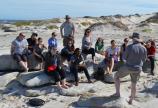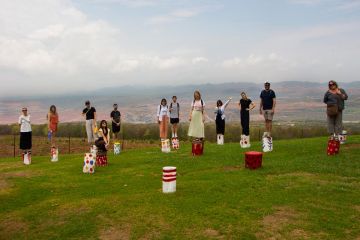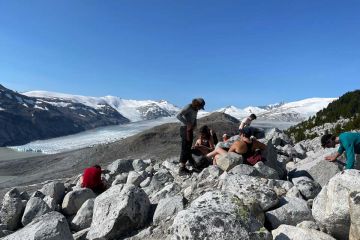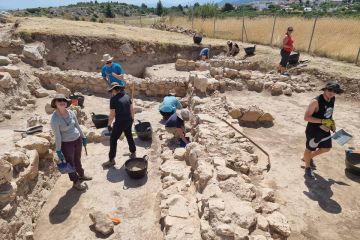Studying the legacies of colonialism in South Africa
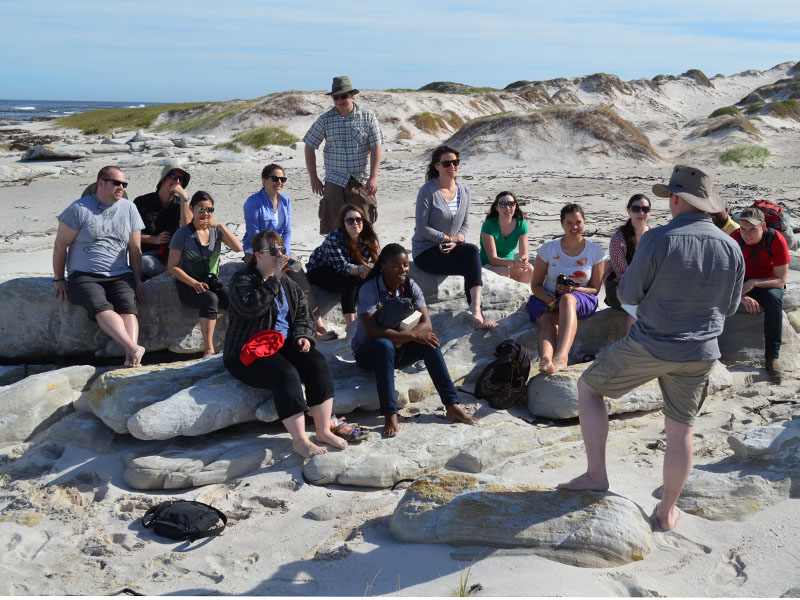
Tess (Taylor) Syrowik is a humanities student in UVic’s Department of Linguistics. This is her personal account of UVic's 2014 Colonial Legacies Field School in South Africa, Apr. 28 - May 21.
Learn more about the 2014 Colonial Legacies field school
South Africa has changed me. I don't know what it is but something is different, something has shifted.
Before departing for South Africa, I admit my greatest concern was the constant company of 12 other students and two chaperones. As a library-dwelling hermit during the school year, the thought of constantly spending that much time with people was frankly intimidating.
One day of the field school and that all changed: we met a woman who lives in a room, smaller than my first-year dorm, with not only her whole family but with two other families as well. The difference in cultural norms struck me.
For me, a middle-class white Canadian, abject poverty was a hazy issue that other people had, not a tangible force that could steal your breath and capture your soul all in one blow.
After seeing the living conditions of these three families who share one room, my concern over spending time with 14 people for three weeks appeared so trivial. Before sleeping I reflected on the day and it left a bitter taste in my mouth. There I lay, warm, safe and dry with food in my belly while countless others shared beds smaller than mine, suffered from hunger and malnutrition and lived in homes that would be considered inadequate in Canada. It brought me to tears. That was my first night in South Africa.
The following weeks taught me more important lessons than any formal or informal education ever has. The women from the township taught me what it really means to share space and forgo privacy. From a man named January I learned what hard work and determination look like while still maintaining a positive attitude. The women from the Women's Farm taught me what it means to never give up, to keep on working hard despite seemingly insurmountable setbacks. Our peers in Nwamitwa unknowingly made us realize how fortunate we are for being able to access a high school education, let alone a university education. The Women's Farm and Khataza Crafts Project demonstrated the meaning of working together and creating a community. There were so many occasions that prompted me to think "I've never heard of anything like this at home" that I started to wonder about our culture, lifestyle, interpersonal relations, everything.
Every time we interacted with the locals of Nwamitwa, especially in Joppie Village where we spent much of our time, we were embraced into the arms and homes of strangers with overwhelming welcome.
There are many aspects of South Africa that we could use more of in Canada; the feeling of welcome into a new heart and home is one of them.
For a long time I felt like we had done nothing to deserve such welcome but then I realized that this sort of welcome is part of the Tsonga culture and that in order to express my appreciation of this culture, I can bring it to Canada by welcoming my friends and family into my home with more warmth and meeting new people with more openness.
Upon returning to Canada
It took every ounce of self-determination for me to get on the plane home and it has not been an easy adjustment, re-adapting to the Canadian lifestyle. Nobody can pretend that Canada does not have problems, does not have poverty. In fact, many First Nations peoples in Canada do not have adequate housing or even drinking water. For the most part, however, we live in a country of plenty – not for all, but for most.
Only through education can we have a better understanding of different lives and find the beauties of different cultures. Your actions define you, not your clothes, technological gizmos and gadgets, or career.
The Colonial Legacies field school was an opportunity of a lifetime. We were able to make friends and work with South Africans who live in a rural area. These new friends taught us a lot about their experiences under apartheid, a democratic government and the struggles many South Africans face.
My time in South Africa taught me a lot about life but most of all, it taught me that how you treat people defines who you are.
Photos
In this story
Keywords: field schools, student life, history, agriculture, human rights, politics, colonialism, africa

